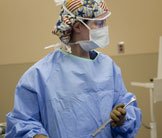Offbeat Occupations: Surgical Technician Familiar with Tools of the Trade
 A surgical technician at Lawrence Memorial Hospital, Elizabeth Pekrul, 26, loves her job for its changing nature. No day is the same: a hernia repair one day, an appendectomy the next.
A surgical technician at Lawrence Memorial Hospital, Elizabeth Pekrul, 26, loves her job for its changing nature. No day is the same: a hernia repair one day, an appendectomy the next.
Read Chansi Long, LJWorld's story.
Elizabeth Pekrul spends her days peering inside people’s bodies.
She has watched surgeons pluck out appendixes, tonsils and gallbladders. She’s seen hernias repaired and knees replaced.
And during each surgery, she has gathered, sterilized and handed the doctor the surgical utensils needed for incision or modification.
A surgical technician at Lawrence Memorial Hospital, Pekrul, 26, loves her job for its changing nature. No day is the same: a hernia repair one day, an appendectomy the next.
“I think you have to be flexible in this job,” says Pekrul. “It’s good to be trained in every specialty.”
Pekrul’s father also works at LMH. He’s the guy in charge of inhaled gases.
“He got me interested in the job,” said Pekrul. “He knew I was a real hands-on type of person.”
Hands-on is an apt adjective to describe Pekrul’s job. At the start of each morning, Pekrul meets with the surgical team at LMH to learn what surgeries are on tap for the day. Afterward, she retrieves the tools for the first surgery: clamps, mallets, reamers, retractors and drills.
In a room called the U, all of the tools are wrapped in plastic and placed in tubs on racks. There are dozens of everything. Some of the tools have bold names — drill bit and turkey foot — but many have the name of the doctor who invented it preceding its title: the Smillie meniscus knife, the Friedman Rongeur, the Schwartz chisel. It’s Pekrul’s job to know the names and functions of all of them.
“Each doctor has (his) own preferences to which utensils to use during certain things, so the surgical technologists have to know that,” said Belinda Rehmer, the communications coordinator at LMH. “(They have to know) this is going to be this doctor and he uses this certain thing … and the (doctors) may do the very same surgery, but they just have different things they like to use.”
Standing in the U, wearing a pair of light blue scrubs, Pekrul pointed to sponges, drapes and gowns, scissors, scalpels and pans. Then she picked up what looked like a pair of pliers.
“These are Rongeurs,” said Pekrul. “These are used to crush and pick up bone.”
Pekrul is familiar with the tools in the U, and after she collects the ones she needs, she carts them to the operating room to arrange them on a sterilized table. During the surgery, Pekrul will pick up each utensil and pass it to the doctor as needed. Though her position is crucial to a surgery’s success, patients are rarely aware of her presence.
Back in the operating room, Pekrul described the complicated cameras, machines and monitors.
“All of this equipment is a camera and light for when we do laparoscopic surgery. That’s when we go … into the abdomen and see what all you’re made of,” she said.
Pekrul’s cellphone buzzed. She punched a button, and a woman’s voice sounded over speakerphone.
“We’re getting ready to change positions in room 4,” the voice said. “Do you have a minute to go help?”
Part of Pekrul’s job is repositioning patients if she’s free. For this surgery, a patient had just had a bone graft from her iliac crest, a piece in the hip bone. For the second leg of the surgery, the doctor would be working on the elbow. For this, the patient had to be turned on her side. There were already enough people to help, so Pekrul said she was busy.
Pekrul is used to being busy. When one surgery ends, another begins. And Pekrul must break the room down, clean it and get things ready for the next patient.
“You have to be willing to stand on your feet 8 hours a day,” said Pekrul.
But the fact that every day rolls in a new set of patients keeps Pekrul excited about her job.
“Sometimes we have weird requests,” she said. “Somebody wanted to keep their hip. (But) we try not to send out too many body parts to the patients, even if they may want them.”